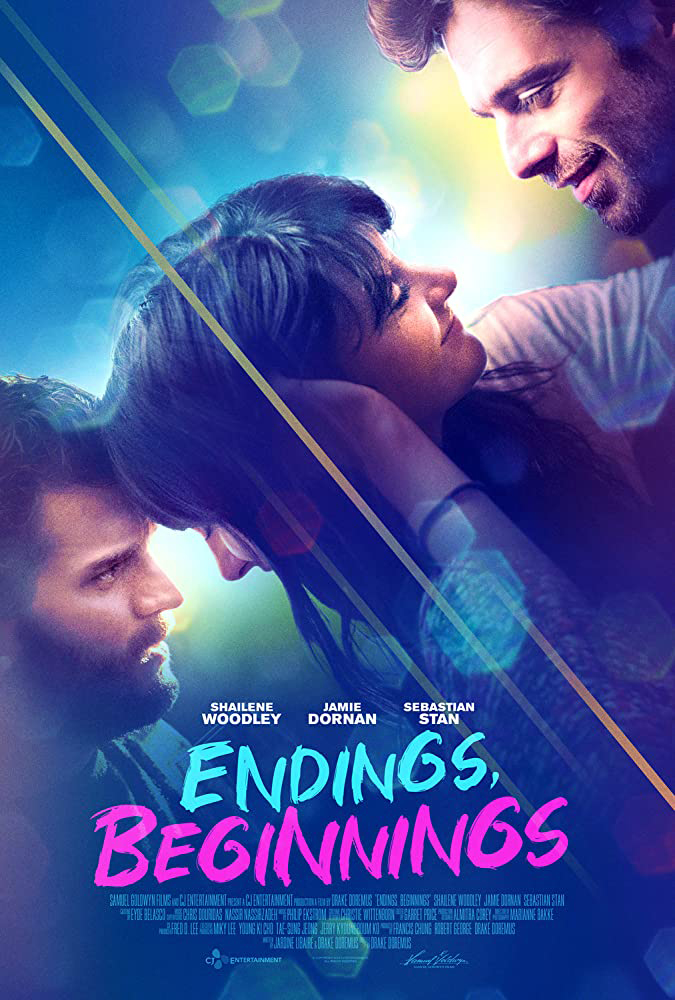Can one come of age in their thirties? In many ways, “Endings, Beginnings”, the new feature from director Drake Doremus, is best considered as a kind of delayed coming-of-age story of a woman coming to terms with her life. And, yet, that categorisation – like many of the potential ones for this restless and compelling indie film – feels inexact. Like its protagonist, “Endings, Beginnings” often seems at crossroads with its varying selves.
It is both to its benefit and detriment that “Endings, Beginnings” resists categorisation and explanation at every turn. The film’s poster, and its advertisement, privileges the idea of the romantic triangle at the centre of the story so that the romantic-drama tag that’s been ascribed to it feels understandable, but also inexact. Doremus’ most notable feature, the indie romance “Like Crazy,” sets a blueprint for the idea of what “Endings, Beginnings” might be. But, eight years later Doremus’ preoccupations have turned from the mutations of romance to something more existential. “Endings, Beginnings”, more than being indebted to its romantic arcs, seems much more aptly considered as a character study of an identity crisis. When I first saw the film at its festival premiere last September, I kept thinking that more than anything it felt as if Doremus was riffing on a subgenre of films from the late 1970s that featured women adapting to their identities post-marriage (Paul Mazursky’s “An Unmarried Woman” is one of the best of these).
In “Endings, Beginnings,” Daphne, our protagonist, is not recently divorced but is enjoying a post-relationship slump and the aftermath of some professional trauma (the latter of which is only illuminated over time). And, although set four decades later than Mazursky’s, her search for identity mirrors the liberation of women that so many directors depicted in the changing seventies. Daphne, a lodger in her sister’s guesthouse, is emotionally and professionally adrift and finds herself uncertain of her future. The potential for professional growth is soon met with the potential for romantic growth when Daphne unwittingly finds herself entangled with two potential suitors who know each other, and from there “Endings, Beginnings” flirts with this quasi romantic-triangle as Daphne ponders her future.
As described, “Endings, Beginnings” sounds trite to the point of banality, but it’s that very banality that Doremus is handily working to examine. The film is very much about the banality of contemporary existence, or more specifically, the banality of Daphne’s own ambivalent existence. Even as she finds herself at crossroads between two lovers, Doremus’ real dramatic flair is intent on presenting Daphne as a woman struggling to recognise her own sense of self. It feels odd to say that the romantic arc in a film that takes great to centre that romantic crisis feels uneven, and yet the romantic plotlines in “Endings, Beginnings” manage to be simultaneously intriguing and patchy. The choice of suitors is, perhaps too prosaic – the free-spirited, unpredictable Frank versus the sober, stable Jack. We’ve seen that divide before and Sebastian Stan as Frank and Jamie Dornan as Jack do enough to develop both sides.
Still, as charming as Dornan is, he’s faced with an immediate crisis where Stan – already the more exciting performer of the two – is given the chance to play the agitated courting of Frank in a more complex way. Doremus and cowriter Jardine Libaire do a better job of qualifying Daphne’s attraction to the ambivalent Frank than the tetchy, if amiable, Jack. It makes the push and pull of the would-be triangle feel less complex than the film demands, robbing it of too much resonance early and it’s further affected by the easier chemistry that Shailene Woodley’s Daphne has with Stan. It’s not until the final act when things fall apart in expected and unexpected ways that the romantic angle seems as well modulated.
Truly, though, the romance feels peripheral to the real fulcrum of the story. This, really, is a film about Daphne and Woodley’s performance as the restless protagonist is the centre of the film’s assets. Her clear-eyed focus as a performer is the necessary support for the occasional airiness of the premise. Woodley is too empathetic and restrained a performer, so the possibility of Daphne’s restlessness appearing as a foible never emerges. Instead, Woodley ensures that Daphne feels familiar and sympathetic in her indecision, balancing the film’s more nebulous digressions and anchoring our focus. It’s vivid work, and feels especially significant as a development of Woodley’s career. Her excellent work in “Adrift” and “Big Little Lies” has previously cemented her transition from young-adult to truly adult themes but the mulish, millennial disquiet of “Endings, Beginnings” – punctuated by bad decisions and dubious choices – feels like a progression of her star persona in thoughtful ways.
Doremus’ penchant for music as character works to good effect here and the film’s soundtrack cultivates the mood of lowkey unease that feels essential to the film’s own aesthetics. If a film can be said to represent the mood of younger millennial restlessness, Doremus captures it here. It’s not just the improvisational aesthetic of the film, which was shot with the script as a guide more than a blueprint, or the moody, gold-tinged lighting from Marianne Bakke’s cinematography that bathes everything in a glow that feels just slightly off. Doremus’ infatuation with the micro-social moments of life rather than the macro ones feels paradoxically significant. There’s the threat of myopia that comes with the film’s inward-looking nature – it rarely contemplates contemporaneous events with any real interest – even when it considers economics, the film seems more hazy than exact on real-world issues. But it’s not a true limitation. Instead, there’s an appealing liminality to the way the film’s point-of-view hews so closely to Daphne’s perspective so that the film’s resolution, when it comes, feels believably unresolved and uncertain.
Like Daphne, “Endings, Beginnings” itself feels as if it’s now forming its own identity – and it’s a dramatic conceit that does not always work. Still, it represents clear developments in Doremus’ career with a particularly welcome focus on privileging female-identity with aplomb. Doremus puts Shailene Woodley front and centre in a gift of a role, and for all the awkward patches of the narrative, the film becomes satisfying in spite of and then because of its ambling restlessness.
Endings, Beginnings premiered around the world last Friday on AmazonPrime Video, iTunes and GooglePlay.







